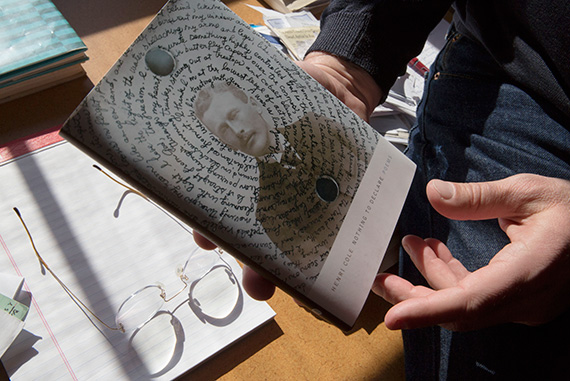Revealed in verse
Henri Cole gives an insider’s view of the poetic life
Henri Cole has published eight poetry collections, including “Middle Earth,” a Pulitzer Prize finalist in 2004. His new collection, “Nothing to Declare,” will be released March 31. He is working on yet another volume of poetry while a fellow at the Radcliffe Institute for Advanced Study, as well as a work of nonfiction tentatively titled “Orphic Paris.” The project mixes autobiography, art, and history, with digressions about poetry. A teacher at Ohio State University, Cole recently spoke with the Gazette about his work.
GAZETTE: Your newest collection is going to blend autobiography and memory. How do you define the relationship between truth and autobiography and memory and poetry?
COLE: All my work blends autobiography and memory. To me, truth is the most important thing in art, after originality. Every good poem must be a little concerto of words. But also, it must be emotionally true.
GAZETTE: Do you approach poetry and nonfiction differently?
COLE: There are so many more words in prose. A poem is like a bottled genie. The bottle makes the genie stronger. Prose is like a great oak on a landscape. The nonfiction I am writing is a poet’s prose, which is to say it expands and contracts, like stanzas, and is descriptive and meditative about life in Paris.
Poems by Henri Cole | Soundbytes
GAZETTE: Do you encourage people to read poetry out loud?
COLE: When I am writing, I always read aloud to test out the sentences against my ear, though a sense of rightness is completely intuitive and individual. In the classroom, I often ask students to memorize and recite poems by others. It’s like being a medical student and cutting into bodies to see how they are made.
GAZETTE: Do you have a poetic form that you prefer, or one you don’t like?
COLE: Many of my poems are free-verse sonnets. I wrote three books of them. To me, the Italian sonnet, with its octave and sestet, is like a deep inhale and transformative exhale. If you are a lyric poet, as I am, it’s a perfect form to both delight in language and say something true.
GAZETTE: What effect does geography have on your writing? Do you think or write differently in Paris versus here or other places?
COLE: In Paris, or Kyoto, or Berlin, or Rome — where I’ve lived — everyday life didn’t nibble away at me. I woke up and worked. I had adventures in the afternoon. Art and culture were great solaces to me. I think travel has pushed me to try things I would never dream up in the little trough of my everyday life.
GAZETTE: What is the hardest thing about writing poetry? What about nonfiction?
COLE: For me, the hardest thing — in both poetry and prose — is to reveal the less-attractive sides of myself. Sometimes, long afterward, poems really embarrass me, but I am proud of the young man who was able to write it all down.
GAZETTE: You grew up in a house where French, English, and Armenian were all spoken. Did that exposure to so many languages influence your choice of career?
COLE: I don’t know why I’m a poet. It must have something to do with my nervous system. It must have something to do with my experience of loneliness as a child. Certainly, hearing other languages spoken introduced the idea of language as a house in which there were many, many corridors and rooms. I regard the entry of poetry into my life as a gift, though it has kept me out of the mainstream.
GAZETTE: If you weren’t a writer, what would you be?
COLE: I think a mother is the holiest thing. I would like to have been a parent. But I think my poems are my progeny. After I am gone, I hope people will say, “He worked hard.”





